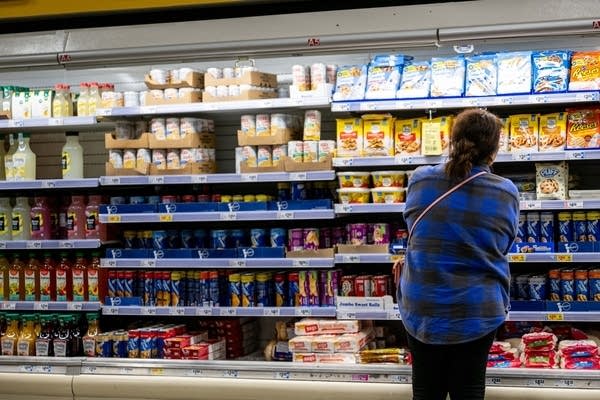Is it actually illegal to sell an item labeled, “Not for retail sale”?
Aiming to keep consumers safe, the Food and Drug Administration has rules for the information placed on packaging.

This is just one of the stories from our “I’ve Always Wondered” series, where we tackle all of your questions about the world of business, no matter how big or small. Ever wondered if recycling is worth it? Or how store brands stack up against name brands? Check out more from the series here.
Listener and reader Craig Morton from Philadelphia asks:
When you buy something in bulk and the labels say “Not for retail sale,” like on granola bars, is there any law preventing someone from selling them individually?
If you’ve ever bought a package of granola bars or a box of hot chocolate mix, you may have encountered individually wrapped items marked with verbiage such as: “Not labeled for individual sale” or “Not intended for retail sale.”
Experts say that yes, trying to sell them would be considered illegal.
“If you go into the business of splitting up packages and selling individually mislabeled products, you are violating the Food, Drug, and Cosmetic Act, and it is an unlawful act,” said Rick Mann, a partner at the law firm Keller & Heckman.
But what you’re selling and the type of seller you are would likely factor into whether regulatory agencies would come after you.
Why we have “Not for retail sale” labels in the first place
The Food and Drug Administration has an “extensive set of regulations” specifying how food labeling should look, including the order of ingredients and even the size of the letters, explained Abby Meyer, a partner at the law firm Sheppard Mullin.
“If you don’t follow these rules, the company’s product could be deemed misbranded,” Meyer said.
So if you’re getting condiment packets at a fast-food chain, those without the list of ingredients on them might say, “Not labeled for retail sale.” Meyer explained that the product might be so small that the company behind it can’t put on all the information it would otherwise be required to include.
“The reason why that is important is the FDA has all these labeling rules in order to keep consumers safe. You should know what ingredients are in your products. If there’s something wrong with your product, you should know who the manufacturer is so that you can contact them. You should know if there are allergens in the product,” Meyer said. “You might end up seeing that language because the food manufacturer is trying to avoid putting a misbranded product into commerce.”
Meyer, who had a box of Lipton Onion Soup & Dip mix in her home, observed that the outside packaging included everything you would expect to find: the nutrition facts, the manufacturer and the ingredients, along with a note that said it may contain milk. However, the individual envelopes said, “This unit not labeled for retail sale,” and did not include a note about milk.
Why does this matter? If someone tried to sell the packets on their own outside of the box they came in, the buyer wouldn’t know what the packet contained. And if you have an allergy to milk, you couldn’t safely eat the contents, Meyer explained.
There are some products with especially high stakes, like baby formula. Labels for formula have their own set of rules, which require including pictorial directions for use, Meyer noted.
“On the individual packages inside of that box, you don’t have to put all that information again,” she said.
Meyer explained when it comes to baby formula, we’re talking about a product consumed by our smallest, most vulnerable population. She said we need to ensure they’re being given formula as safely as possible — hence the warning that individual packages can’t be sold on their own.
Meanwhile, you’ll find that condiments or any other goods sold in bulk likely won’t carry that warning if they do print key information, like the ingredients or the distributor’s name, on each package.
Exceptions were also made for restaurants back in 2020. During the early months of the pandemic, the FDA temporarily loosened labeling requirements for those businesses, many of which wanted to sell some of their supplies to consumers to alleviate their financial challenges.
How the FDA handles misbranded products
There are many instances in which the FDA pursued cases involving misbranded products.
“If you get an enforcement letter from the FDA, you usually have just a few weeks to respond to it and correct the issue. If you don’t correct the issue, the FDA can issue an injunction preventing you from selling that product in the market at all, and it can also seize all of the misbranded products out of the market,” Meyer said. “So if you as a company have put a whole bunch of these out into commerce, it can be a huge financial loss.”
But for the average person hawking individual candy bars, Rick Mann explained that the likelihood of the FDA being aware of it is probably low.
“Whether they’re going to come after you really would depend on whether or not they became aware of the fact that you were doing it, how much you were doing it and whether or not they view that as a substantial risk to consumers,” he said.
For example, if you’re selling a product containing peanuts that didn’t disclose the ingredient on the packaging, the FDA might get “very concerned” because this item can cause deadly allergic reactions, Mann said.













